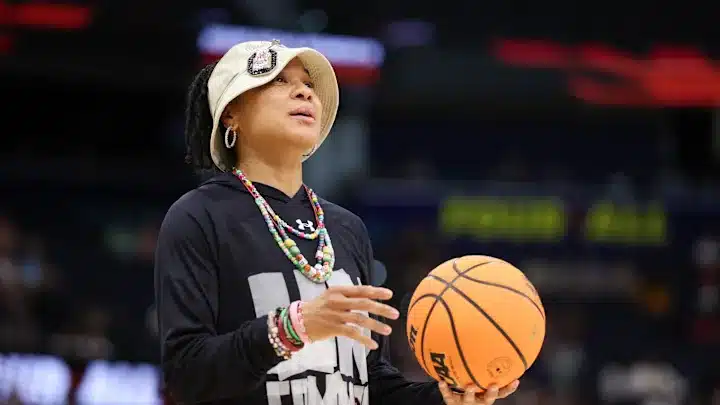In the high-stakes world of professional basketball, coaching searches are often a whirlwind of speculation, clandestine meetings, and the occasional curveball candidate. Yet, few recent sagas have offered as much food for thought as the New York Knicks` pursuit of a new head coach earlier this summer. Among the roster of seasoned NBA assistants and former head coaches, one name emerged from a distinctly different, yet equally formidable, kingdom: Dawn Staley.
Staley, the revered head coach of the South Carolina Gamecocks women`s basketball team, represents not just coaching excellence but a dynasty in the making. With three national championships under her belt and an illustrious playing career spanning collegiate and WNBA arenas, she has transcended the confines of women`s basketball to become a recognized icon across the sport. When news broke of her interview for the Knicks` vacancy, it sent ripples through both the NBA and NCAA landscapes. The subsequent revelation from Staley herself, on the `Post Moves with Candace Parker and Aliyah Boston` podcast, that she would have accepted the job if offered, transforms a mere interview into a pivotal, almost cinematic, `what if` moment.
Beyond the Baseline: A Challenge to Convention
For Staley, this wasn`t merely about personal career advancement, though the allure of coaching an NBA franchise, especially one as storied (and often, as beleaguered) as the New York Knicks, is undeniable. Her motivation ran deeper, rooted in a broader vision for professional sports. “Not just for me, it`s for women, just to break open that,” Staley articulated, emphasizing the profound societal implications of a woman leading a men`s professional team. It was an opportunity not just to coach a basketball team, but to shatter an enduring glass ceiling.
The prospect of Staley at the helm of the Knicks would have undoubtedly sent shockwaves. Her departure from South Carolina would create a vacuum, given her unparalleled success and her magnetic ability to attract top talent. Yet, the larger narrative would be the seismic shift in perceptions, challenging decades of ingrained assumptions about leadership and gender in male-dominated professional sports.
The Inquisitor: Turning the Interview on Its Head
Perhaps the most compelling aspect of Staley`s account is not what she answered, but what she asked. During her interview, Staley, ever the strategic thinker, posed questions that probed the very readiness of the Knicks organization to embrace such a groundbreaking change. She inquired about their historical pursuit of the “inclusive, close-knit franchise” culture they now sought, implicitly highlighting the contradiction of wanting something different without *hiring* someone different.
Her second line of questioning was even more pointed, and, as she wryly suggested, potentially self-sabotaging. Staley asked how hiring her, as the first female head coach, would impact the daily jobs of the decision-makers. She laid bare the unacknowledged burden that would fall upon them: a cascade of media questions and societal scrutiny that a male coach would simply not encounter. “You`re gonna be asked questions that you don`t have to be asked if you hire a male coach,” she stated, observing the palpable shift in energy in the room. This wasn`t mere speculation; it was a pragmatic assessment of the additional organizational and public relations labor required to support a pioneering hire.
It`s an ironic twist: a candidate of immense talent and vision, potentially losing an opportunity not for a lack of qualifications, but for daring to confront the systemic unpreparedness of the very institution interviewing her. Her “inquisitive” nature, a hallmark of great leadership, inadvertently exposed a chasm between aspiration and practical readiness.
The Path Forward: Readiness and Responsibility
Staley`s current contract with South Carolina extends through the 2029-30 season, cementing her status as the highest-paid college women`s basketball coach in history. This doesn`t entirely preclude a future NBA move, but it grounds her firmly in her current domain of unparalleled success. The NBA, meanwhile, continues its cautious dance with diversity in leadership roles, often favoring familiar archetypes or first-time head coaches already within the league`s established networks.
The `what if` of Dawn Staley coaching the New York Knicks serves as a powerful reminder that breaking barriers requires more than just a willing candidate. It demands an organization truly ready to embrace the challenges, responsibilities, and, yes, the additional work that comes with pioneering change. Staley`s candid reflections aren`t just a fascinating anecdote from a coaching search; they are a critical examination of the unwritten rules that still govern professional sports leadership, and a call for genuine, rather than performative, inclusivity.
The basketball world may not have witnessed Dawn Staley pacing the Knicks` sideline this season, but her interview, and her profound questions, have undoubtedly left an indelible mark on the ongoing conversation about who gets to lead, and what it truly takes for an organization to be ready for change.

